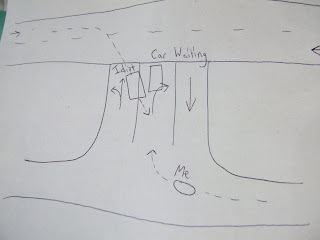Well, another postless month has passed, and I feel fairly guilty about that. At the same time, nobody left a comment on the last post, so I felt fairly confident that after the last hiatus, a number of people gave up on checking for updates.
So, I'm just going to put this short post up as a bit of an appeal. Like I mentioned before, life has become life here. That is, I've essentially stopped viewing this as a job I have away from home, as it has become my job and my home for the time being. It's increasingly difficult to view this as something separate from my life. That said, I really don't know what I can post that will be interesting. So please, please ask questions. I can respond in-depth to questions, but if I just draw from current events, my descriptions may end up kind of shallow.
I'm quickly approaching the end of my first year here, and the wonderful events have mixed with frustrations. There's plenty of positives that make life here worthwhile and rewarding, and there's plenty of things I will never become accustomed to. This has led me to begin questioning why I am here, especially in terms of the job that I have. Now that I have friends and a life outside of my job, what truly is the most important aspect of my life here? I've concluded that while I came here for the teaching job, it was more likely than not an opportunity for a gateway. I wanted to come back to Japan, and this program is clearly one of the best options for a college graduate. I work hard at school and will still stay late for the sake of the kids and do exactly that quite often. But still, I know that teaching high school is not my dream and that I am potentially building for my future here. It would be nice to achieve fluency in the language and let that open doors down the line for government jobs or something like that, but my hobbies like stand-up and writing just have too much of a pull. I like to tell stories, and my command of English is absoutely invaluable to me. The ability to express my ideas with carefully selected words, intonations, and timing is something I cherish. And even if I can become fluent, I have no delusions about being able to do the same in Japanese.
In the present, I am happy. Every day here is good, and there are plenty of moments with friends or even strangers that are truly quite touching. The humanity of people here is something that is sometimes almost baffling. The job security is solid, and I am able to pay off student loans and save money quite comfortably. But there's a nagging sensation that these benefits may lead me to procrastinate. After the next year here, I think I may be ready to come home. Even if I can't find a job easily and live with the same comforts as right now, time passes, and I am confident that I can only pursue my passions when I am back home. I yearn to sit at a table and tell a story to a group of smiling friends or family or to put a mic in my hand.
So that's that. If I think about the present, it's wonderful. But if I think about the future, I know what I have to do, and I just don't think Japan is there. That's fine. In the meantime, ask me questions.
Oh! My main school had the "culture festival" recently. This is a day where the students who will graduate this year get to be themselves and put on small, student-written performances. Each class has a homeroom teacher who gradually becomes their mentor and builds a relationship with them, so these teachers generally participate, too. Other teachers who just have a good sense of humor get in on it as well. Now, the students love the opportunity to get on stage and open their mouths for once in their high school careers, but this seems to translate into a massive desire for cross-dressing. The girls typically had subdued, tame roles in all the performances, whereas the boys got wigs, tights, and dresses and had a ball. Considering this is deemed the festival of culture, it's a little comical. There's a good chance that through the festival and this blog, they have successfully conveyed to my readers a perverted sense of what Japanese culture is. It was very interesting to see the students who most represent to me a diversion from the typical Japanese student. The performances were absolutely packed with choreographed dances, but this usually translates to a dozen or so girls standing on stage and moving their limbs in a very lifeless fashion. They are carrying out all the pre-determined dance moves, but it's done with no emotion whatsoever. Suddenly, in one dance, a few girls started busting out really impressive dance moves. One girl had a smile on her face the whole time, clearly enjoyed it, and moved around in a really fluid way. I don't intend to stereotype, but when I see this, I instantly think of such a girl as likely to not be very "Japanese". To have fun is human, but to let your inhibitions go on stage is something that I think Japanese have particular trouble training themselves to do. It's interesting to see students who break that mold.
Another moment I occasionally have here is when I suddenly enter a somewhat surreal state of mind and begin to see those around me simply as people. It sounds troubling to state that I might look at a Japanese person and first see them as Japanese and then second as a human, but that's something we can't readily control. We see someone and we instantly and unconsciously register things in our mind based on sight. But when I can dig through that and consider that no matter what food we eat or language we speak, we are all human and share certain common traits and desires, it's an interesting and profound feeling. It happened recently at karaoke, of all places:
I was at karaoke with a friend, my girlfriend, and her friend. Her friend was singing a song and my girlfriend was paying no attention to the screen. She was searching for a new song in the song book. But she was singing along to the song from memory. I suddenly began to think about how for me to know that song is a huge endeavor: I'd have to memorize it and hear it dozens of times to be able to recite it from memory. And even then it's just memory. I realized that she not only knows the song in a language I merely have a basic command of, but there also history, her childhood and upbringing, and cultural elements embedded in it that I will never know. The opposite is true as well: even if she became fluent in English, she wouldn't feel the same way as I do when singing "The Star Spangled Banner" from memory. And all of these differences between what I know and what she knows all arose simply because we were born in two different spots on the globe. It's a strange thing to consider. Similarly, there's something about the birds here. Many are species that exist in North America, too. I smile to myself when I think that these birds don't know that they are in Japan. They just eat, fly away, and go to bed. For some reason, that intrigues me. Well, that's all for now. I started this out feeling very homesick, but writing more reminded me of why I'm glad to be here. Cool.
Later, America!
































